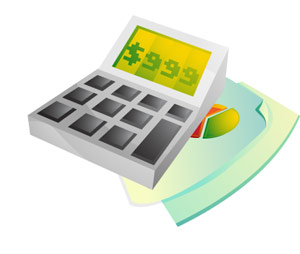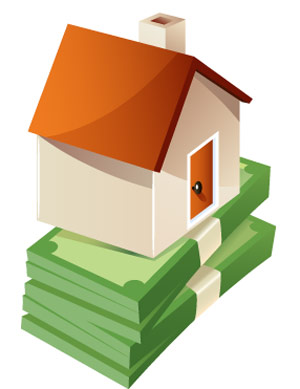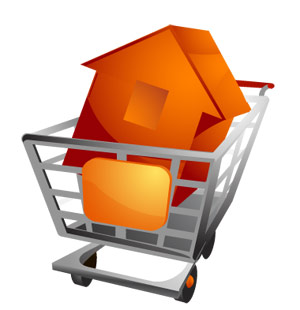
HOMEBUYING 101
 By every measure, the housing market is ready to come roaring back. The combination of bargain prices, historically low interest rates and a generally more upbeat economic outlook has proven irresistible to previously hesitant buyers, who are now perusing real estate magazines, visiting homebuilder websites and touring new-community model centers.
By every measure, the housing market is ready to come roaring back. The combination of bargain prices, historically low interest rates and a generally more upbeat economic outlook has proven irresistible to previously hesitant buyers, who are now perusing real estate magazines, visiting homebuilder websites and touring new-community model centers.
In fact, many of the same experts who predicted that we would become a nation of renters are now touting the unassailable benefits of home ownership.
The American Dream is alive and kicking. And if you thought you couldn’t afford to buy in 2006, it’s quite possible that you can’t afford not to buy in 2013. Just look at the facts.
It’s now less expensive to buy a home than to rent one in 98 of the nation’s top 100 metro areas. And Orlando is one of the markets in which buying instead of renting is virtually a no-brainer.
That’s according to Trulia’s Rent vs. Buy Index, which compares the total cost of home-ownership to the total cost of renting. Trulia, a residential real estate website for buyers, sellers and real estate professionals, lists properties for sale and rent and compiles local, regional and national statistical data related to housing.
“Since the start of the great recession, many former homeowners flooded the rental market,” says Pete Flint, CEO of Trulia. “As a consequence, renting has become relatively more expensive than buying in most markets.”
The Trulia index first determines the median price of buying a home and the median price of renting a comparable home in each market it surveys. Here’s how they arrive at a comparison.
To determine the true monthly cost of owning, Trulia combines the monthly mortgage payment as well as insurance, property taxes and even repairs and maintenance.
To determine the true monthly cost of renting, Trulia combines the monthly rental payment, assuming modest increases, as well as the security deposit and renter’s insurance.
Using this data, the company’s number-crunchers determine an average monthly cost for owning, assuming you’ve put 20 percent down and have qualified for a mortgage with an interest rate of 3.5 percent.
The ownership calculation also assumes that the home will be sold at the end of seven years. So an estimated profit from the sale is retroactively thrown into the mix.
Then, it’s a simple matter to compare the two sets of numbers over a seven-year period. At the end of seven years, assuming you sell your home and have taken all the appropriate tax deductions, how much will you have actually spent? Is it more or less than you would have spent had you rented a comparable home during that same period of time?
There are, of course, plenty of caveats to consider. What if you don’t sell after seven years? What if you can’t put 20 percent down? What if your mortgage interest rate is higher than 3.5 percent? Is it still cheaper to buy than to rent under different circumstances?
The answer is, it can be. Trulia’s calculation is based on specific assumptions that may not apply to you. But you can figure it out by using Trulia’s Buy vs. Rent Calculator at trulia.com.
Here’s how the numbers shake out for Orlando, using a Trulia’s hypothetical criteria. Over seven years, it will have cost $50,988 to own a home and $112,920 to rent a comparable home. That’s a difference of $61,992, or 55 percent.
The favorable buy-rent equation in Orlando, as well as other Florida markets, is heavily influenced by mortgage defaults. In fact, Orlando has consistently ranked among the nation’s hardest-hit markets in terms of foreclosures, which is one reason local home values have tumbled by 48 percent over the past five years.
According to CoreLogic, a national real estate consulting firm, the rate of Orlando-Kissimmee-Sanford area foreclosures among outstanding mortgage loans was 10.81 percent in October, the latest month for which data is available. That’s slightly higher than the state average of 10.69 percent and considerably higher than the national average of 3.06 percent.
Scary? Yes. But there’s growing evidence that the bottom has been reached and the market is bouncing back. Foreclosure rates, while still high, are down from 12.87 percent last October and are projected to continue falling.
But the real news is about home appreciation. Values locally increased by a cumulative $5.6 billion in 2012, according to Zillow, an online real estate database. That’s a stunning $9 billion swing from 2011, when the company calculated that homes lost $3.6 billion in value. Best of all, it’s the first year-over-year increase recorded by Zillow researchers since 2006.
All of this suggests that buyers today have a relatively short window of opportunity to take advantage of extraordinary bargains.
But you’ve heard the “buy now” message before, and it turned out to be unsupportable. Why should this time be any different? It’s simple. This time, the message is based on hard data, not a pundit’s prediction or a builder’s sales pitch.
Every objective measure says to act, and act quickly. So, let’s look at some commonly asked questions about homebuying in light of current market conditions.

Q. Why should I buy, instead of rent?
A. A home is an investment. When you rent, you write your monthly check and that money is gone forever. But when you own your home, you can deduct the cost of your mortgage loan interest from your federal income taxes.
This is significant because for a number of years most of your monthly payment consists of interest.
You can also deduct the property taxes you pay as a homeowner. In addition, despite the uncharacteristic behavior of the market over the past few years, the value of your home will almost certainly go up, thereby building equity. Of course, the days of buying, flipping and doubling your money are likely gone forever. But over time, a new home is still a solid investment.
Finally, you’ll enjoy having something that’s all yours — a home where your personal style will tell the world who you are.
Q. Can I become a homebuyer even if I don’t have stellar credit, and even if I don’t have much for a down-payment?
A. Yes, you can. Lenders can often find a way to get you financed, although it may not be at the most favorable interest rate. Or, you may be a good candidate for a Federal Housing Administration (FHA) loan. FHA is a part of the Department of Housing and Urban Development (HUD).
Unlike conventional loans that adhere to strict underwriting guidelines, FHA-insured loans require very little cash down. In addition, there’s more flexibility in calculating household income and payment ratios.
Q. Yes, but my credit is really iffy. What can I do to improve it?
A. During the downturn, many people who had pristine credit found themselves falling behind on their bills. Others lost their jobs and had to file for bankruptcy.
Unfortunately, it takes time to get back on your feet financially. And a poor credit score, regardless of the reason, makes it more difficult to buy a home.
“Be sure your credit score is 640 or higher,” notes Robert Palmer, president of RP Funding in Maitland, a direct mortgage lender. “Ninety percent of banks and borrowers need this number to qualify for a loan.”
Palmer also says to avoid so-called “credit repair” companies that claim to scrub negative credit histories. He says lenders use specialized software to detect any unlikely changes to a would-be borrower’s credit report.
Greg Vanzzana with Coldwell Banker’s Park Avenue office says that many first-time buyers he works with have skimpy credit histories. For example, using a debit card instead of a credit card may be desirable, but it doesn’t built credit. Neither does paying rent to a parent or a roommate.
“The best thing to do is start looking for ways now to build credit,” Vanzzana adds. “Use a pre-paid credit card. Take out a car loan or some other line of credit. Anything that shows you’re paying bills on time.”
Q. Aren’t the mortgage-lending rules changing? Will it be harder or easier to get a loan?
A. Hopefully, easier. Here’s what happened. In January, the Consumer Financial Protection Bureau (CFPB) laid out rules prohibiting banks and other lenders from making home loans that offer deceptive teaser rates or require no documentation from borrowers.
The rules, which take effect next January, will also set some limits on interest-only packages or negative-amortization loans, where the balance due grows over time. Banks can make these loans, but the new rules wouldn’t protect them from potential borrower lawsuits if they do so. (One reason loans have been harder to come by, even for creditworthy applicants, is because lenders have been sued by borrowers who have defaulted, claiming they were misled and sold mortgages they couldn’t afford.)
In addition, mortgage originators will, in most cases, be restricted from charging excessive upfront points and fees, from making loans with balloon payments and from making loans that saddle a borrower with total payments exceeding 43 percent of their income.
Financial regulators are trying to create a legal distinction between “qualified” loans, which follow the new rules and are immune from legal action, and “unqualified” loans of the sort that precipitated the real-estate crash. By following the new rules, banks will have the assurance that they can’t be successfully sued for reckless or abusive lending practices as long as they grant “qualified” mortgages.
“When consumers sit down at the closing table, they shouldn’t be set up to fail with mortgages they can’t afford,” says Richard Cordray, director of the CFPB. “Plus, our ‘ability-to-repay’ rules protect borrowers from the kinds of risky lending practices that resulted in so many families losing their homes.”
Mortgage bankers say that the new rules clear up uncertainty that has hindered the home lending business since the financial crisis. “These rules offer protection for consumers and a clear, safe environment for banks to do business,” says David Stevens, chief executive of the Mortgage Bankers Association. “Now everybody knows if you stay inside these lines, you’re safe.”
The new rules don’t impact underwriting standards for government-sponsored enterprises such as Fannie Mae and Freddie Mac. And new loans can be considered “qualified” even if the borrower has a payment-to-income ratio of more than 43 percent as long as the loan is eligible for purchase or guaranteed by Fannie Mae or Freddie Mac, for example, or by one of several government agencies such as the Department of Veterans Affairs.
So far, the consuensus among mortgage lenders seems to be that the new rules will enable them to loosen the purse strings, at least for qualified buyers.
Q. Should I use a real-estate broker? How do I find one?
A. Most new-home builders have their own on-site sales agents or contract with a real-estate brokerage firm to handle sales and marketing for them. But an independent real-estate broker can be very helpful, especially because homebuying has become so complex.
A good broker can guide you through the entire process and will be thoroughly familiar with such important factors as the quality of the schools, the reputation of the builder and the track record of appreciation in specific neighborhoods.
A broker can also help you narrow your choices and do some legwork on your behalf, saving hours of fruitless driving-around. And when it’s time to make an offer on a home, he or she can explain the advantages and disadvantages of different types of mortgages, guide you through the paperwork and be there to answer last-minute questions when you sign the final papers at closing.
And, best of all, you don’t have to pay the broker. Commission comes from the seller, not from the buyer. Check out the Orlando Regional Realtor Association (ORRA) website at nefar.com for more information about choosing a broker and to view a directory of members.
Garrett Kenny, a Realtor with Century 21 Team Feltrim, says buyers should choose real estate professionals who know both the resale and the new-home market and have extensive, insider insights regarding the neighborhoods in which they have listings.
Of course, with the click of a mouse, buyers can call up more information, more quickly, than ever before. Still, a broker can help sharpen the focus and provide valuable guidance. Kenny’s office, for example, has installed individual kiosks where buyers can do their own research and ask questions when they’re ready.
 Q. How much money will I have to come up with to buy a home?
Q. How much money will I have to come up with to buy a home?
A. That depends on a number of factors, including the cost of the house and the type of mortgage you get. The more money you can put into your down payment, the lower your mortgage payments will be. Some types of loans require 10-20 percent of the purchase price while FHA loans require only 3 percent down, and sometimes less.
Shopping for a loan is like shopping for any other large purchase: you can save money if you look around. Different lenders may offer different interest rates and loan fees, so talk with several lenders before you decide.
Q. What do I need to take with me when I apply for a mortgage?
A. You should have Social Security numbers for both you and your spouse, if both of you are applying for the loan; copies of your bank account statements for the past six months; evidence of any other assets, such as stocks and bonds; a recent paycheck stub; a list of all credit card accounts and the approximate monthly amounts owed on each; a list of balances due on outstanding loans, such as car loans; copies of your most recent two income tax statements; and the name and address of someone who can verify your employment.
Q. How do I know which type of mortgage is best for me?
A. Most people chose fixed-rate mortgages. With a fixed- rate mortgage, your interest rate stays the same for the term of the mortgage, which normally is 30 years. The advantage of a fixed-rate mortgage is that you always know exactly how much your payment will be, and you can plan for it.
Another type of mortgage is an Adjustable Rate Mortgage (ARM) in which your interest rate and monthly payments usually start lower than with a fixed-rate mortgage, but can change as often as once or twice a year. The adjustment is tied to a financial index, such as the U.S. Treasury Securities index. The advantage of an ARM is that you may be able to afford a more expensive home because your initial interest rate will be lower.
There are several government mortgage programs, including those administered by the Veteran’s Administration and the Department of Agriculture. As we’ve discussed, although FHA doesn’t actually make loans, it insures them for approved lenders, which encourages them to make loans to people who might not otherwise qualify.
Vanzzana suggests checking out online sources, such as lendingtree.com. “You’ll have access to lenders that you wouldn’t normally have access to,” says Vanzzana. “Look for the best rate for you, not just what a lender finds for you.”
In the new-home industry, some builders have in-house mortgage financing arms. You don’t have to use them, but there’s a convenience factor and the chance that a company with a vested interest in selling you a home will work harder to get you approved. Many lenders affiliated with builders also offer incentives of one kind or another.
Jeff Tierney, branch manager for DHI Mortgage, an affiliate of D.R. Horton Homes, says the best way to find out about special financing offers is to visit new-home communities. “Builder promotions change from time to time, but sales professionals are up-to-date on those specifics,” he says.
For example, DHI Mortgage offers incentives for first responders, educators or veterans. Highland Homes offers a $99 down payment option and down payment assistance programs for first-time buyers.
Palmer says the key is to be honest with your lender. “The more information you can provide, the stronger your pre-approval letter will be,” he says.
TOTAL COST IF YOU BUY (7 YEARS)
$50,988
TOTAL COST IF YOU RENT (7 YEARS)
$112,920
DIFFERENCE
55% LESS TO BUY
ASSUMPTIONS
• You buy a meidan-priced home, put 20% down and qualify for a mortgage with a 3.5% interest rate.
• You live in the home for seven years.
• You sell the home at the end of seven years and benefit from a modest rate of appreciation.
• You have taken advantage of all appropriate tax deductions during the seven years of ownership.
• You have paid appropriate property taxes during the seven years of ownership.
• You have paid homeowners’ insurance and normal repair and maintencance costs during the seven years of ownership.
